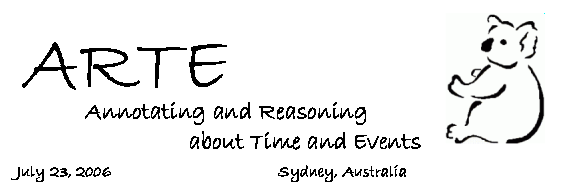

Author login:

News
March 29, 2006 - The paper deadlines have been extended. Please click here for the updated informationMarch 21, 2006 - ARTE is now taking paper submissions. To submit a paper, please visit this site. The deadline for submitting papers is March 31st, 11:59pm EST (GMT -5:00). If you have any questions or problems submitting a paper, please contact Amber Stubbs.

Chairs:
Branimir Boguraev, IBM T.J. Watson Research Center, USAbran@us.ibm.com
Rafael Munoz, University of Alicante, Spain
rafael@dlsi.ua.es
James Pustejovsky, Brandeis University, USA
jamesp@cs.brandeis.edu

Workshop Description
The computational analysis of time is a challenging and very topical problem, as the needs of applications based on information extraction techniques expand to include varying degrees of time stamping and temporal ordering of events and/or relations within a narrative. The challenges derive from the combined requirements of a mapping process (text to a rich representation of temporal entities), representational framework (ontologically-grounded temporal graph), and reasoning capability (combining common-sense inference with temporal axioms).
Usually contextualized in question-answering applications (with obvious dependencies of answers on time), temporal awareness directly impacts numerous areas of NLP and AI: text summarization over events and their participants; making inferences from events in a text; overlaying timelines on document collections; commonsense reasoning in narrative and story understanding.
Interest in temporal analysis and event-based reasoning has spawned a number of important meetings, particularly as applied to IE and QA tasks (cf. at COLING 2000; ACL 2001; LREC 2002; TERQAS 2002; TANGO 2003, Dagstuhl 2005). Significant progress has been made in these meetings, leading to developing a standard for a specification language for events and temporal expressions and their orderings (TimeML). While recent research in the broader community (as indicated, for instance, in the most recent symposium on Annotating and Reasoning about Time and Events) highlights TimeML's status as an interchange format, this workshop, however, is not intended to focus on TimeML exclusively. Likewise, while the ultimate goal of temporal analysis is to facilitate reasoning about time and events, the formal aspects of this problem are being addressed by other meetings (see, for instance, the TIME 2006 Symposium). Instead, the workshop will explore largely the linguistic implications for temporal-analytical frameworks.
The goal of the meeting, therefore, is to address issues already raised, but not fully explored---including but not limited to the following:
- infrastructure questions: temporal annotation methodology, tools; reliable measures of inter-annotator agreement; community resources.
- analytical frameworks: temporal information extraction; approaches to temporal expression normalization; relationship between named entity recognition and temporal entities analysis; dependency (or not) upon syntactic and discourse structure.
- mapping to time ontology(ies): completeness of the representation framework; formalization of the process; additional temporal reasoning capabilities required.
- reasoning over time: in particular, (robust) reasoning within representational schemes demonstrably derivable with current IE/analytical frameworks.
- applications of temporal analytics and reasoning: in addition to NL tasks, of particular interest are studies of temporal information as it manifests in, and impacts, different domains: beyond news, time is intrinsically essential in eg. legal, health-care, intelligence, financial contexts.
- national language: relationship between language characteristics and
representational frameworks; generalizations of temporal analytics
across multiple languages; multi-/cross-lingual resource development.

Target Audience and Participants
This workshop will be of interest to those creating or exploiting temporally annotated corpora; those developing information extraction, question answering, and summarization systems relying on temporal and event ordering information; researchers involved in creating chronicles and timelines from textual data (legal, health-care, intelligence); semantic web designers and developers wanting to link web ontologies and standards to temporal markup from natural language; researchers interested in temporal properties of discourse and narrative structure; and those interested in annotation environments and development tools.

Important Dates and Other Information
Papers due: April 14, 2006 (at 11:59pm North American EST (GMT -5)).
Acceptance/rejection notification: May 6, 2006.
Final version due: May 26, 2006.
Conference: July 23, 2006.
For more details, refer to the ACL-COLING 2006 website.

Program Committee
David Ahn University of Amsterdam The Netherlands Nicholas Asher University of Texas Austin, TX USA Paul Buitelaar DFKI, Saarbruecken Germany Harry Bunt Faculty of Arts Tilburg University, The Netherlands Corina Forascu University of Iasi Romania Robert Gaizauskas University of Sheffield England Jerry Hobbs ISI/USC, Marina del Ray CA USA Graham Katz University of Osnabrueck Germany Bernardo Magnini ITC-IRST Trento, Italy Inderjeet Mani MITRE Bedford, MA USA Patricio Martinez-Barco University of Alicante Spain Matteo Negri ITC-IRST Trento, Italy Frank Schilder Thomson Legal and Regulatory Co. Eagan, MN USA Andrea Setzer University of Sheffield England Marc Verhagen Brandeis University Waltham, MA USA 
Related Links: